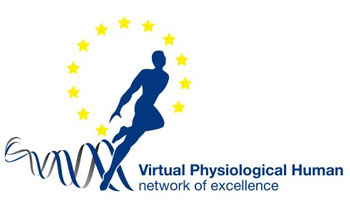 The STEP VPH Research roadmap suggested the possibility to establish a European Institute entirely dedicated to the Virtual Physiological Human (VPH). This initiative has been re- proposed and expanded in the recent "Vision & Strategy" document of the VPH NoE, and has recently been exposed to the judgement of the community at large through the launch of a petition. Given the overwhelmingly positive reaction of the community, with nearly 300 signatures from over 30 countries, the Pro Tempore Board of Directors has now formally entered the Constituent process and should be completed before the end of 2010.
The STEP VPH Research roadmap suggested the possibility to establish a European Institute entirely dedicated to the Virtual Physiological Human (VPH). This initiative has been re- proposed and expanded in the recent "Vision & Strategy" document of the VPH NoE, and has recently been exposed to the judgement of the community at large through the launch of a petition. Given the overwhelmingly positive reaction of the community, with nearly 300 signatures from over 30 countries, the Pro Tempore Board of Directors has now formally entered the Constituent process and should be completed before the end of 2010.
In the 2007 VPH Research Roadmap, produced by the STEP Action, the following was written: The NoE will evolve a unified VPH community over the period of the 7th FP, and will plan the instrument(s) by means of which its longevity can be assured subsequently, possibly via the establishment of a VPH Institute.
More recently, in the 2009 A Vision and Strategy for the VPH in 2010 and beyond document, which was produced by the VPH NoE as an update to the STEP roadmap, was written: There is a growing consensus among VPH stakeholders that in order to ensure long-term sustainability of the VPH initiative, it is necessary to establish a collective identity in the form of an international, non-governmental, not-for-profit organisation, hereafter referred to as the VPH Institute. The scope of this institute will be to sustain the coordination of all academic, governmental, industrial, and societal stakeholders' efforts toward the common goal of developing an integrative biomedical science and technology that makes the VPH vision practically possible, effective, sustainable, and ethical.
A public petition in support to the creation of a European VPH Institute was launched in December 2009, polling the VPH Community on this initiative. To date nearly 300 experts from over 30 countries have signed this petition, clearly expressing their support to this idea.
In agreement with the STEP VPH Research roadmap, the "Vision and Strategy" document of the VPH NoE, and the results of the public petition, a pro tempore board has been formed, with the mandate from the VPH community to incorporate a new legal organisation called the "VPH Institute" as an international non-profit organization according to Belgian law.
The Pro Tempore Board in charge of incorporating the VPH Institute is composed of the following members:
- Marco Viceconti (Chair) - Istituto Ortopedico Rizzoli, Italy - Scientific coordinator of the STEP support action and of the VPH NoE outreach activities
- Rodney Hose - University of Sheffield, United Kingdom – Principal Investigator in various VPH projects
- Alejandro Frangi - Universitat Pompeu Fabra, Spain - Coordinator of @neurIST and Principal Investigator in other VPH projects
- Peter Kohl - University of Oxford, United Kingdom - Co-Coordinator fo the VPH NoE
- Peter Hunter - University of Auckland, New Zealand - Founder of the IUPS Physiome initiative
- Karl Stroetmann - Empirica, Germany - Expert of impact assessment of VPH Technology
- Peter Sloot - University of Amsterdam, The Netherlands - Coordinator of ViroLab
- Jos vander Sloten - Katholieke Universiteit Leuven, Belgium - Vice President of EAMBES
- Dipak Kalra - University College London, United Kingdom - Clinical expert of eHealth technologies
This group of prestigious experts is expected to compile the statute and incorporate the institute by the end of 2010.
For those who are interested, more details on the rationale and the constituent process can be found in the memo entitled VPH Institute: the European think-tank on future health technology that has been recently published by the Pro Tempore Board of Directors.
For further information, please visit:
http://www.vph-noe.eu
Related news articles:
About the VPH Network of Excellence
The VPH Network of Excellence (VPH NoE) is designed to foster, harmonise and integrate pan-European research in the field of i) patient-specific computer models for personalised and predictive healthcare and ii) ICT-based tools for modelling and simulation of human physiology and disease-related processes.
The main objectives of the VPH Network of Excellence are to support the:
- Coordination of research portfolios of VPH NoE partners through initiation of Exemplar integrative research projects that encourage inter-institution and interdisciplinary VPH research.
- Integration of research infrastructures of VPH NoE partners through development of the VPH ToolKit: a shared and mutually accessible source of research equipment, managerial and research infrastructures, facilities and services.
- Development of a portfolio of interdisciplinary training activities including a formal consultation on, and assessment of, VPH careers.
- Establishment of a core set of VPH-related dissemination and networking activities which will engage everyone from partners within the VPH NoE/other VPH projects, to national policy makers, to the public at large.
- Creation of Industrial, Clinical and Scientific Advisory Boards that will jointly guide the direction of the VPH NoE and, through consultation, explore the practical and legal options for real and durable integration within the VPH research community.
- Implementation of key working groups that will pursue specific issues relating to VPH, notably integrating VPH research worldwide through international physiome initiatives.
Finally, by involving clinical and industrial stakeholders, VPH NoE also plans to lay a reliable ground to support sustainable interactions and collaboration between research and healthcare communities.